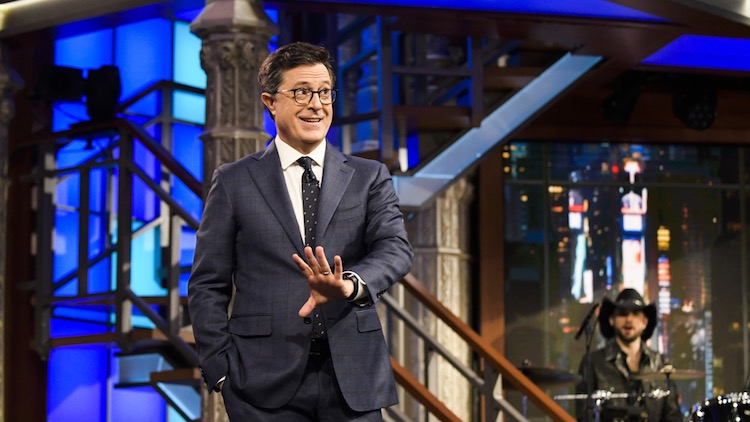WGA Hot Over FCC’s Stephen Colbert 'Investigation'

The smarter way to stay on top of broadcasting and cable industry. Sign up below
You are now subscribed
Your newsletter sign-up was successful
An FCC spokesperson confirmed Monday that it is vetting the viewer complaints it received about Stephen Colbert's Late Show riff on President Donald Trump, which did not sit well with the creative community.
FCC chairman Ajit Pai has said the FCC would look into any complaint it received and apply its rules to the facts presented and take "appropriate action."
"Appropriate action" almost certainly means no action for a couple of reasons: 1) the comments—a bleeped oral sex reference, an unbleeped body part and some name calling—came in the FCC's 10 p.m. to 6 a.m. safe harbor, where anything short of obscenity is not actionable, and 2) the bar for obscenity is very high (online porn, for example, which offends many, has not been found to be obscene, except in the case of minors, or it would be illegal).
But even the talk about investigations has the creative community on edge, particularly with those already wary about the Trump Administration's threats to other kinds of media.
“As presidents of the Writers Guilds of America, East and West, we were appalled to read recent remarks by Federal Communications Commission chair Ajit Pai," said Writers Guild of America East president Michael Winship and Writers Guild of America West president Howard Rodman, in a joint statement. "He said the FCC would investigate a joke about Donald Trump by Writers Guild member Stephen Colbert, 'apply the law' and 'take appropriate action' if the joke were found to be 'obscene.'"
“Pai’s remarks are just the latest in a series of statements by the current administration indicating a willful disregard of the First Amendment. Colbert was poking fun at authority, a time-honored American tradition and an essential principle of democracy. What is obscene is not what Colbert said but any attempt by the government to stifle dissent and creativity. Our unions vehemently support Colbert and his writers and will fight for their or anyone’s right to publicly express his or her opinion of our elected officials.”
But even complaints that are eventually dismissed have costs, says John Crigler, a partner with Garvey Schubert Barer in Washington, who has defended broadcasters against indecency and even obscenity claims, including holding up deals, license renewals, or pressure to settle.
"The complaint can be the punishment," he says.
The smarter way to stay on top of broadcasting and cable industry. Sign up below
Contributing editor John Eggerton has been an editor and/or writer on media regulation, legislation and policy for over four decades, including covering the FCC, FTC, Congress, the major media trade associations, and the federal courts. In addition to Multichannel News and Broadcasting + Cable, his work has appeared in Radio World, TV Technology, TV Fax, This Week in Consumer Electronics, Variety and the Encyclopedia Britannica.

